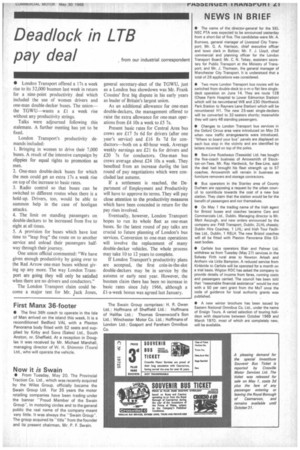Deadlock in LTB pay deal
Page 23

If you've noticed an error in this article please click here to report it so we can fix it.
from our industrial correspondent
• London Transport offered a 1 7s a week rise to its 32,000 busmen last week in return for a nine-point productivity deal which included the use of women drivers and one-man double-decker buses. The union— the TGWU—wants a £1 a week rise without any productivity strings.
Talks were adjourned following this stalemate. A further meeting has yet to be fixed.
London Transport's productivity demands included: 1. Bringing in women to drive their 7,000 buses. A result of the intensive campaign by clippies for equal rights to promotion as men.
2. One-man double-deck buses for which the men could get an extra 17s a week rise on top of the increase to basic rates.
3. Radio control so that buses can be switched to different routes when there is a hold-up. Drivers, too, would be able to summon help in the case of hooligan attacks.
4. The limit on standing passengers on double-deckers to be increased from five to eight at all times.
5. A provision for buses which have lost time to "leap frog" the route on to another service and unload their passengers halfway through their journey.
One union official commented: -We have given enough productivity by going over to the Red Arrow one-man buses without giving up any more. The way London Transport are going they will only be satisfied when there are no drivers and conductors."
The London Transport claim could become a major test for Mr. Jack Jones.
general secretary-elect of the TGWU, just as a London bus showdown was Mr. Frank Cousins' first big dispute in his early years as leader of Britain's largest union.
As an additional allowance for one-man double-deckers, the management offered to raise the extra allowance for one-man operations from £4 lOs a week to £5 75.
Present basic rates for Central Area bus crews are £17 5s 6d for drivers (after one year's service) and £16 8s 7d for conductors—both on a 40-hour week. Average weekly earnings are £21 6s for drivers and £20 7s for conductors. One-man bus crews average about £24 lOs a week. They benefited from an increase during the last round of pay negotiations which were concluded last autumn.
If a settlement is reached, the Department of Employment and Productivity will have to approve its terms. They will pay close attention to the productivity measures which have been conceded in return for the pay rises involved.
Eventually, however, London Transport hopes to run its whole fleet as one-man buses. So the latest round of pay talks are crucial to future planning of London's bus services. Conversion to one-man operations will involve the replacement of many double-decker vehicles, The whole process may take 10 to 12 years to complete.
If London Transport's productivity plans are accepted, the first coin-in-the-slot double-deckers may be in service by the autumn or early next year. However, the busmen claim there has been no increase in basic rates since July 1966, although a £1-a-week bonus was agreed last January.












































































































